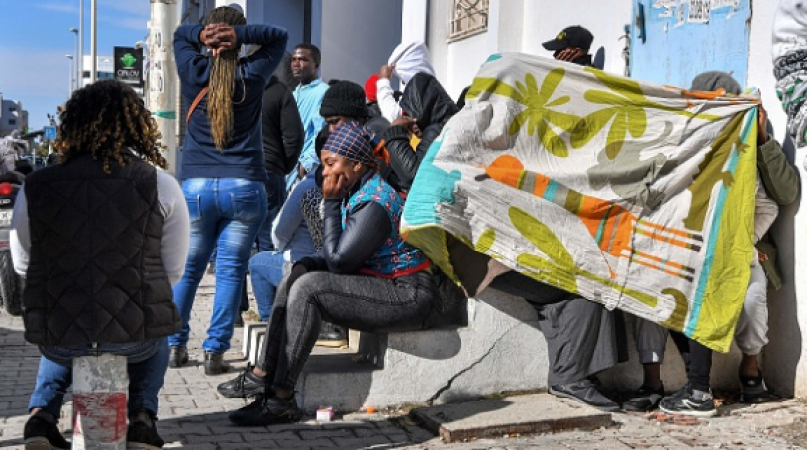
Beirut: Many African nationals are still homeless and jobless weeks after Tunisia's violent crackdown on migrants that led to a dangerous rush to leave by smuggler boats for Italy, and some claim they are still the target of racist attacks.
This week, dozens of African migrants protested in front of the UN refugee agency in Tunis by the makeshift camp where they have been staying, some of them with children, ever since the government ordered landlords to evict them from their homes.
"We must be evacuated. Not safe is Tunisia. When you have this colour, nobody has a future in this place. Josephus Thomas pointed to the skin on his forearm and declared, "It is a crime to have this colour.
Also Read: In England and Wales more than two-thirds of Muslims reside in areas with high unemployment rates
The African Union referred to President Kais Saied's announcement of the crackdown on Feb. 21 as "racialized hate speech" because he claimed that illegal immigration was a criminal plot to alter Tunisia's demographics.
Saied's remarks, according to US Assistant Secretary of State Barbara Leaf, sparked "attacks and a tidal wave of racist rhetoric," with rights organisations reporting that hundreds of migrants had been hurt or insulted.
In response to accusations that he or the government are racist, Saied and Tunisia's foreign minister announced steps to relax visa requirements for Africans and reminded law enforcement of anti-racism laws.
Although the official crackdown seemed to have ended weeks ago, migrants claim they continue to experience abuse.
After the president's speech, people remarked, "Since you are in our country, don't you have any dignity?" Outside the UNHCR headquarters in Tunis, Sudanese refugee Awadhya Hasan Amine said, "I kept quiet and they told me I am dirt.
Also Read: A Muslim man in the Ottawa train station requested not to pray there
Amine and her husband fled Sudan and then Libya and have been living in Tunis for five years. She has been residing on the sidewalk outside the UNHCR office since locals threw rocks through the windows of her home in the Rouad district of the capital when she was just 30 years old.
"We desire a secure, peaceful environment in which to live. There shouldn't be any issues in Tunisia, she declared.
Many people are still trapped in Tunisia despite the fact that some West African nations evacuated hundreds of their citizens earlier this month. They are unable to support themselves, much less afford to travel home or pay smugglers hundreds of dollars to transport them to Europe.
Africa is home to Tunisia. Why do they treat us in such a racist way? said Moumin Sou, a Mali native who lost his job as a barmaid following the president's speech and was assaulted the following day by a stranger who had stolen his money.
He claimed that while Sou wants to continue on to Europe, many others are adamant about returning home.
Smuggler crossings to Italy have increased in the wake of the crackdown, in which police detained hundreds of undocumented migrants and authorities urged employers to fire them and landlords to evict them.
Also Read: UK athletes run the Palestine Marathon and raise thousands of dollars for charity
Smuggler crossings to Italy have increased in the wake of the crackdown, in which police detained hundreds of undocumented migrants and authorities urged employers to fire them and landlords to evict them.
Houssem Jbeli, a representative of the Tunisian National Guard, reported that the coast guard stopped 30 boats carrying more than 2,000 people just on Wednesday. Five people drowned after four boats capsized on the same day and the day after, according to the authorities.